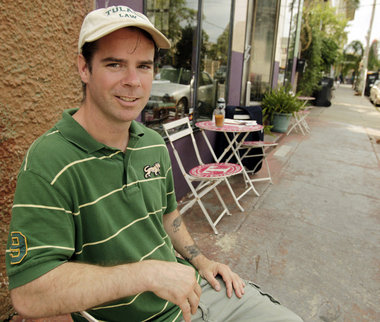A volcano of controversy erupted earlier this month after the news broke that Tulane University’s Law School had admitted a convicted killer into its first year class, with students expressing concern for their safety and others wondering if their school acted unethically in admitting the ex-con. But an ethics professor says the ex-convict will likely practice law, and another ex-con who is now a lawyer says the student should be applauded.
Bruce Reilly, 38, who served a 12-year sentence for stabbing a college professor to death when he was 20, was outed by Above The Law, which published details of the murder and comments from concerned students at Tulane.
One Tulane student wrote, “I would like to stress that it is simply unconscionable that the law school would admit such a student, knowing he would never be allowed to sit for the bar in any state.”
But Reilly wrote in a letter to Above the Law, “By the time I apply to a state or federal bar, my last criminal activity will be as a teenager, and over two decades passed. I will be presenting a model case for rehabilitation, an impressive resume, and a substantial list of esteemed supporters. I have found that a majority of our society believes in forgiveness and second chances, and all I can do is keep doing what I’m doing.”
Even as a convicted felon, Reilly will still follow the same process as all law school grads who apply to take the bar exam, according to a spokeswoman from the Louisiana Supreme Court. That process includes passing a character and fitness review, she said.
Bruce Green, a professor at the Louis Stein Center for Law and Ethics at Fordham University says Reilly will likely find a state bar that will admit him.
“It’s not impossible for this student to find a bar and a state that will be open to being convinced that he has turned his life around,” Green said.
It’s not going to be a cake walk, though. Bar candidates with questionable backgrounds are put under the microscope by character committees.
“There would be the high burden on him to establish that he has the character to practice law,” Green said. “The profession would look pretty stupid if it admits someone that has a criminal background and they then engage in professional wrongdoing.”
The fact Reilly has received two scholarships — including a Dean’s Merit Scholarship and one from NAACP — has further flustered some of his 700-some law school peers as more and more students face mounting loans.
“We evaluate each law school applicant as an individual, taking into account all available information bearing on their character, life story and academic qualifications,” said David Meyer, dean at Tulane University School of Law, in a statement on Reilly’s admittance. “Our admission process also allows for exceptional circumstances if the prospective student’s experience and background will contribute to his and his peers’ study and appreciation of various aspects of the law”.
During his incarceration and since his release in 2005, Reilly has mended his reputation by advocating for prisoners’ human rights and diving into film and theater.
But students have still expressed concern for their safety.
“It’s troubling that these [law students] are going to be future lawyers and view someone like this,” said Roland Acevedo, an attorney in New York. “How are they going to view their clients later on? You cannot be making those judgment calls when you are a lawyer.”
Acevedo knows a little what it is like for Reilly. The Fordham University law graduate is also an ex-convict who served 10 years in prison.
“This guy should be applauded, not singled out and ridiculed. He’s overcome tremendous struggles,” Acevedo said.
Acevedo has a similar past. He was in jail for a conviction of robbery and another for drugs. When he was released on his mother’s birthday in 1988, he replaced an addiction to heroin with a healthy alternative — pursuing a law degree.
“To stay straight I needed to do something to keep me focused by working with people,” he said.
He did his time in the real world, working up the legal ladder by getting a job at the Legal Aid Society and finishing a bachelors’ degree in nighttime city college with a 4.0. In the early 1990s he was accepted into a slew of top-notch law schools like Fordham University, Columbia University and New York Law School, despite his taboo past that was fully disclosed in his applications.
Despite his tarnished past, Acevedo seems to be doing just fine and has had his own practice for about a decade, representing ex-cons who are mistreated in the real world.
He credits his success to surrounding himself with the right mentors, one of which is Green, his former professor at Fordham. After being selected for a competitive clerkship out of law school, he started the Osborne Association’s family law unit and is vice chairman of the Fortune Society, which helps former prisoners find work.
“When I was going to apply to law school there were a lot of naysayers, saying I was wasting time and money,” he said. “I didn’t buy into that. It’s like baseball; you can’t hit a home run unless you get up and swing.”
Reilly is not the only ex-offender currently in law school. Desmond Meade, a former drug addict found guilty of firearm possession in 2001, is currently a second year law student at Florida International University in Miami.
“We have to give back to our community — not just as a passing fancy, but as a way of life,” said Meade, in an interview with National Jurist last fall.


